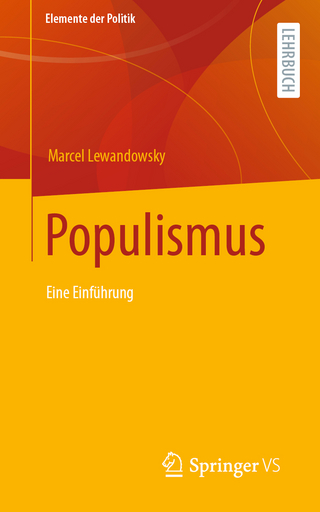
Introducing Comparative Politics - International Student Edition
Cq Press (Verlag)
978-1-0718-0770-5 (ISBN)
Stephen Orvis is Professor of Government at Hamilton College. He is a specialist on sub-Saharan Africa (Kenya in particular), identity politics, democratic transitions, and the political economy of development. He has been teaching introduction to comparative politics for more than twenty-five years, as well as courses on African politics, nationalism and the politics of identity, political economy of development, and weak states. He has written a book and articles on agricultural development in Kenya, as well as several articles on civil society in Africa and Kenya, and is currently doing research on political institutions in Africa. Carol Ann Drogus is a retired Professor of Government at Hamilton College. She is a specialist on Brazil, religion, and women’s political participation. She taught introduction to comparative politics for more than twenty years, as well as courses on Latin American politics, gender and politics, and women in Latin America. She has written two books and numerous articles on the political participation of women in religious movements in Brazil.
Part I: A Framework for Understanding Comparative Politics
Chapter 1: Introduction
Comparative Politics: What Is It? Why Study It? How to Study It?
Three Key Questions in Comparative Politics
Key Concepts
Works Cited
Resources for Further Study
Web Resources
Chapter 2: The Modern State
Characteristics of the Modern State
Historical Origins of Modern States
Strong, Weak, and Failed States
Case Studies of State Formation
Case Study: Germany: The First Modern Welfare State
Case Study: Japan: Determined Sovereignty
Case Study: United Kingdom: The Long Evolution Of A Strong State
Case Study: The United States: A Consciously Crafted State
Case Study: Mexico: Challenges To Internal Sovereignty
Case Study: China: Economic Legitimacy Over Political Reform
Case Study: Brazil: A Moderately Strong, and Now Legitimate, Modern State
Case Study: India: Enduring Democracy In A Moderately Weak State
Case Study: Russia: Strong External Sovereignty with Weak Rule of Law
Case Study: Iran: Claiming Legitimacy Via Theocracy
Case Study: Nigeria: An Extremely Weak State
Conclusion
Key Concepts
Works Cited
Resources for Further Study
Web Resources
Chapter 3: States, Citizens, and Regimes
Citizens and Civil Society
Regimes, Ideologies, and Citizens
Case Study: United Kingdom: “Cradle of Democracy”
Case Study: Russia: The First Self-Proclaimed Communist Regime
Case Study: Germany: Rise of the Nazi Party and a Totalitarian State
Case Study: Brazil: A Modernizing Authoritarian Regime in Military Form, 1964–1985
Case Study: Nigeria: A Personalist Regime in Uniform, 1993–1998
Case Study: Mexico: Electoral Authoritarianism under the PRI
Case Study: The Islamic Republic of Iran: Theocratic State, 1979–
Conclusion
Key Concepts
Works Cited
Resources for Further Study
Web Resources
Chapter 4: States and Identity
Understanding Identity
The Policy Debate
Nations, Nationalism, and Immigration
Case Study: Nationalism in Germany
Ethnicity
Case Study: The Evolving Role of Ethnicity in Nigeria
Race
Case Study: Racial Politics in the United States
Social Class
Case Study: The United Kingdom: Evolving Class Politics in a Class-divided Society
Religion: Recognition, Autonomy, and the Secular State
Case Study: India: Secularism in a Religious and Religiously Plural Society
Gender and Sexual Orientation: The Continuing Struggle for Recognition, Social Status, and Representation
Case Study: Iran: Women’s Social Gains, Political and Cultural Restrictions, and Islamic Feminism
Case Study: Brazil: LGBTQ Rights in a New Democracy
Conclusion
Key Concepts
Works Cited
Resources for Further Study
Web Resources
Part II: Political Systems and How They Work
Chapter 5: Governing Institutions in Democracies
Executives and Legislatures
Case Study: Parliamentary Rule in Britain and India
Case Study: Presidentialism in the United States and Brazil
Case Study: Russia: Semipresidentialism in a New Democracy with Weak Institutions
Comparing Executive-Legislative Institutions
Judiciary
Case Study: The Judiciary: Brazil
Bureaucracy
Case Study: Bureaucratic Control and Corruption: Japan
Federalism
Case Study: Federalism: Mexico, India, and Russia
Conclusion
Key Concepts
Works Cited
Resources for Further Study
Web Resources
Chapter 6: Institutions of Participation and Representation in Democracies
The Electoral System
Formal Institutions: Political Parties and Party Systems
Civil Society
Case Studies in Participation and Representation
Case Study: The United Kingdom: SMD/FPTP, Two Parties, and Pluralism
Case Study: Germany: A Multiparty System and Neocorporatism under Threat
Case Study: Japan: From Dominant-Party to Two-Party System?
Case Study: Brazil: Parties and Civil Society in a Young Democracy
Conclusion
Key Concepts
Works Cited
Resources for Further Studies
Web Resources
Chapter 7: Contentious Politics: Social Movements, Political Violence, and Revolution
Framing Contentious Politics
Case Study: The United States: The Tea Party and the Resistance
Political Violence
Case Study: Mexico: The Zapatista Rebellion
Case Study: Nigeria: Boko Haram and Terrorism
Revolution
Case Study: Revolution: China and Iran
Conclusion
Key Concepts
Works Cited
Resources for Further Study
Web Resources
Chapter 8: Authoritarian Institutions
Trends in Authoritarian Rule
The Dictator’s Dilemma: Governing Authoritarian Regimes
Elections, Parties, and Legislatures
Clientelism and Civil Society
Case Study: China: From Communist to Modernizing Authoritarian Rule
Case Study: Russia: Creating an Electoral Authoritarian Regime
Case Study: Iran: A Theocratic, Electoral Authoritarian Regime
Conclusion
Key Concepts
Works Cited
Resources for Further Study
Web Resources
Chapter 9: Regime Change
Trends in Regime Change
Regime Change: Transitions to Democracy
Case Study: Mexico: Transition from an Electoral Authoritarian Regime
Case Study: Nigeria: Neopatrimonial Transition
Regime Change: Transitions to Authoritarian Rule
Case Study: Comparing Coups: Brazil and Nigeria
Part III: Political Economy and Policy
Chapter 10: Political Economy of Wealth
The Market, Capitalism, and the State
Key Economic Debates
Types of Capitalist Economies
Globalization: A New World Order, or Déjà Vu All Over Again?
States and Markets around the World
Case Study: The United States: The Free-Market Model
Case Study: United Kingdom: Radical Reform in a Liberal Market Economy
Case Study: Germany: Struggling to Reform a Coordinated Market Economy
Case Study: Japan: The Developmental State and Its Crisis
Conclusion
Key Concepts
Works Cited
Resources for Further Study
Web Resources
Chapter 11: Political Economy of Development
What Is “Development”?
Development and Globalization
The Development Debate
Case Studies in Development
Case Study: Mexico: From Protectionism to Neoliberalism
Case Study: China: An Emerging Powerhouse
Case Study: India: Development and Democracy
Case Study: Iran: Struggling with the Blessings of Oil
Case Study: Nigeria: A Weak State, Oil, and Corruption
Conclusion
Key Concepts
Works Cited
For Further Study
Web Resources
Chapter 12: Public Policies When Markets Fail: Welfare, Health, and the Environment
“Welfare”: Social Policy in Comparative Perspective
Case Study: Germany: Reforming The Christian Democratic Welfare State
Case Study: The United States: Reforming the Liberal Welfare State
Case Study: Brazil: Starting a Welfare State in a Developing Economy
Health Care and Health Policy
Case Study: Germany: Pioneer of Modern Health Policy
Case Study: United Kingdom: Reforming the NHS
Case Study: U.S. Health Policy: Trials and Tribulations of the Market Model
Environmental Problems and Policy
Case Study: The United States: Pioneer That Lost Its Way?
Case Study: China: Searching for Sustainable Development
Conclusion
Key Concepts
Works Cited
Resources for Further Study
Web Resources
Glossary
Index
| Erscheinungsdatum | 04.02.2020 |
|---|---|
| Verlagsort | Washington |
| Sprache | englisch |
| Maße | 203 x 254 mm |
| Gewicht | 1150 g |
| Themenwelt | Sozialwissenschaften ► Politik / Verwaltung ► Vergleichende Politikwissenschaften |
| ISBN-10 | 1-0718-0770-6 / 1071807706 |
| ISBN-13 | 978-1-0718-0770-5 / 9781071807705 |
| Zustand | Neuware |
| Haben Sie eine Frage zum Produkt? |
aus dem Bereich


